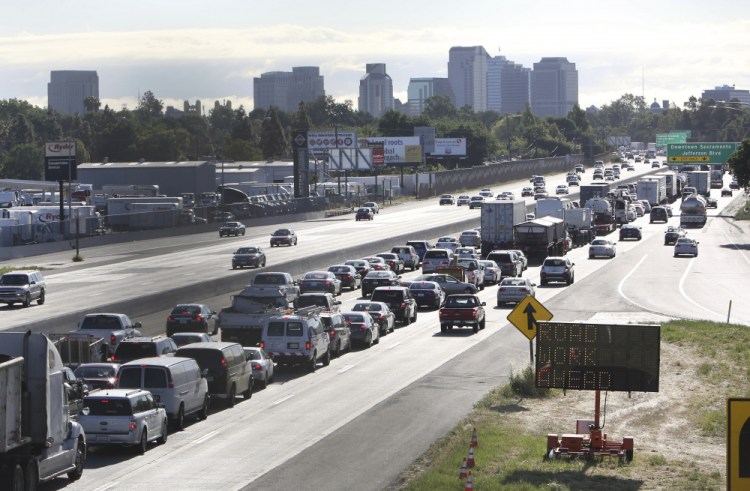The Environmental Protection Agency announced Monday that it will move to grant California permission to set stricter climate requirements for cars and SUVs, a reversal of a key Trump administration policy.
The step, coming days after the Transportation Department withdrew Trump-era restrictions of state tailpipe emission rules, could help pave the way for a broader climate deal with the nation’s automakers.
The administration’s actions will give the populous state with big climate ambitions more leverage in discussions between car company executives, autoworkers and federal officials over national mileage and greenhouse gas emission standards for new passenger vehicles. Thirteen states and D.C. have signed onto California’s tailpipe emission standards. Collectively they represent 36 percent of the U.S. auto market.
“I am a firm believer in California’s long-standing statutory authority to lead. The 2019 decision to revoke the state’s waiver to enforce its greenhouse gas pollution standards for cars and trucks was legally dubious and an attack on the public’s health and well-being,” Biden’s EPA administrator, Michael Regan, said in a statement. “Today, we are delivering on President Biden’s clear direction to tackle the climate crisis by taking a major step forward to restore state leadership and advance EPA’s greenhouse gas pollution reduction goals.”
On Thursday, Transportation Secretary Pete Buttigieg took his own action by proposing to withdraw his department’s part of a Trump administration rule blocking states from setting their own tailpipe standards. And both announcements come on the heels of a summit hosted by Biden meant to spur other nations to ramp up their commitments to tackling climate change and build momentum for passage of an infrastructure package meant to build out a nationwide network of charging stations.
“The transportation sector is the U.S. economy’s largest contributor to greenhouse gases,” Buttigieg said Thursday in remarks at a charging station in Union Station in D.C. to celebrate Earth Day. “And that relationship to the problem of climate change means that we in transportation can also be the biggest part of the solution.”
The proposed Transportation Department rule, which will be subject to 30 days of public comment once it is published in the Federal Register, will no longer bar individual states such as California from establishing their own greenhouse gas emissions standards and zero-emissions vehicle mandates.
A year ago, the EPA and the National Highway Traffic Safety Administration finalized a rule to improve average fuel efficiency by 1.5 percent per year, compared with a nearly 5 percent annual increase that was set to take effect under President Barack Obama. But just last week, investigators with the EPA’s inspector general concluded the Trump administration improperly sidelined career staffers when unwinding Obama-era pollution standards.
But Republicans say giving California the authority to set its own stricter standards may lead to a patchwork of car pollution rules in different states that will frustrate both carmakers and consumers. They also argue tough emissions rules will make new cars more expensive, encouraging Americans to keep driving older and less-safe vehicles.
“If the Biden administration is serious about road safety, affordability, and securing a cleaner American energy future, he should not be allowing California to dictate the vehicles people drive in Indiana, South Carolina, Ohio, or in eastern Washington,” said Washington Rep. Cathy McMorris Rodgers, the top Republican on the House Energy Committee, in a statement.
But carmakers, autoworkers and environmentalists are eager to strike a deal with both the federal government and California to create one set of nationwide standards for tailpipe emissions. It will take a few months for the Biden administration to restore California’s authority to impose greenhouse gas standards on cars and trucks. Regan told lawmakers Wednesday that the administration will propose nationwide standards for tailpipe emissions in mid-July.
“States like California have historically the right to lead the way,” he said. “The federal government can indeed learn from states, and that’s what we plan to continue to do.”
Even without a waiver from the federal government to set its own pollution standards, California Gov. Gavin Newsom, D, announced last year that the state would phase out sales of gasoline-powered cars by 2035.
Several major automakers, too, have announced plans to end sales of cars with internal-combustion engines in the coming decades. The Japanese automaker Honda is the latest, announcing last week during Biden’s climate summit that it plans to stop selling gasoline-powered vehicles in North America by 2040. General Motors has pledged to stop making gas-fueled passenger cars, vans and sport utility vehicles by 2035.
But some advocates and politicians are pressing automakers to move even faster, which has caused tensions with both some companies and the industry’s largest union, the United Auto Workers.
Dan Becker, who directs the Center for Biological Diversity’s Safe Climate Transport Campaign, said in a phone interview that California and its other state allies can serve a key role in the negotiations once they are again empowered to “protect their people more than the federal government requires.”
“California has provided a backstop when the federal government refused to adequately protect people from auto pollution,” he added.
Send questions/comments to the editors.



Success. Please wait for the page to reload. If the page does not reload within 5 seconds, please refresh the page.
Enter your email and password to access comments.
Hi, to comment on stories you must . This profile is in addition to your subscription and website login.
Already have a commenting profile? .
Invalid username/password.
Please check your email to confirm and complete your registration.
Only subscribers are eligible to post comments. Please subscribe or login first for digital access. Here’s why.
Use the form below to reset your password. When you've submitted your account email, we will send an email with a reset code.